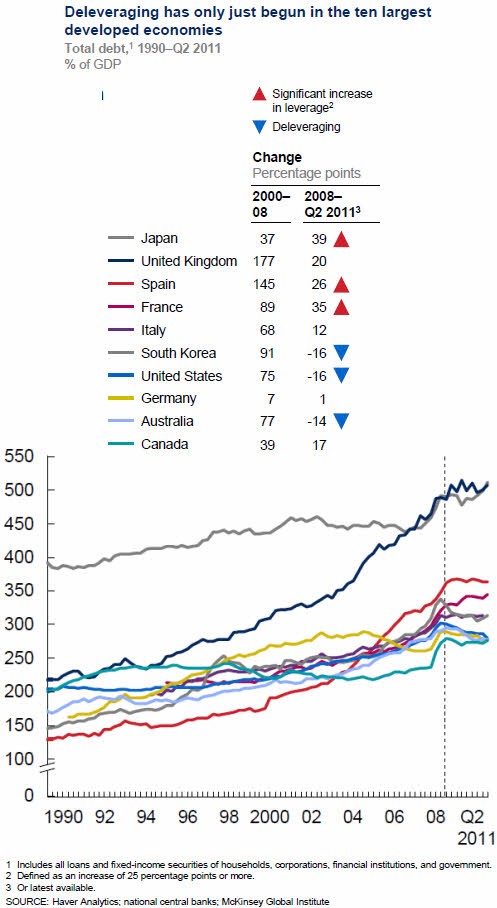Australia an exception in the debt stakes. Since the 2008/09 financial crisis, total debt has actually grown across the world’s ten largest mature economies is the finding of a study by the McKinsey Global Institute.
Australia, along with the United States and South Korea, to go against the trend with a decline in the ratio of total debt to GDP.

The McKinsey report argues that safely reducing debt and clearing the way for economic growth in the aftermath of the global credit bubble will take many years for most developed countries and involve difficult choices. Major economies, it says, have only just begun deleveraging. In only three of the largest mature economies — the United States, Australia, and South Korea — has the ratio of total debt relative to GDP fallen.
The private sector leads in debt reduction, and government debt has continued to rise, due to recession. However, history shows that, under the right conditions, private-sector deleveraging leads to renewed economic growth and then public-sector debt reduction.
In the United States, Canada, and Australia, household debt is the largest component of overall debt. In Canada and Australia, there are concerns about the high ratio of household debt relative to GDP, even though neither country has experienced a banking crisis.

And so it came to pass. The “absolutely wonderful outcome for the income of lobbyists” that I feared last week would be the outcome of Labor reneging on its deal to introduce a mandatory pre-commitment scheme for poker machines.
Mount a strong campaign and Prime Minister Julia Gillard will cave in, especially if the target group primarily is Labor MPs from New South Wales.
Not the fastest workers. There’s one thing you can say for sure about Fair Work Australia. It is not the fastest working organisation in the country. Surely establishing whether there is a case against how Labor MP Craig Thomson behaved when national secretary of the Health Services Union cannot be that hard.







Yeah, Fair Work Australia could dry hire a ‘journalist’ from somewhere and get them to write some crap. Written by a proper work hardened journalist, most of the media would run it without a problem. They could probably get it up for 3-4 days and no one would be any the wiser about Craig Thomson’s continuing presence in parliament. It’s fair work and it pays well, if you can get it.
I am rapidly coming to the conclusion that corruption in this country in in is no different from what we’ve come to expect in countries like Indonesia, Malaysia, India and China, to nominate four obvious examples without including the whole of Africa and the Middle East. Apparently Fair Work Australia has now drifted into its fourth year of analysis of the Craig Thomson affair and in applying Occam’s razor to the situation, the proposition that Fair Work Australia has been politically nobbled is the inescapable conclusion. Incompetence and ineptitude have been effectively eliminated by the appalling time delay. No competent organisation would have taken this long to resolve this matter.
The alternatives scenario is gross functional incompetence, but because of the dependence of the Gillard labour government on Thomson’s vote, political corruption would be my prime choice of the reason for the delay. I suspect we will not get an answer until after the next election.
Message to the moderator
I have reviewed my post, and can find nothing that should require moderation. Would you please advise what is the naughty word in the above post?